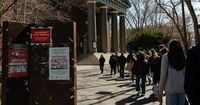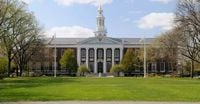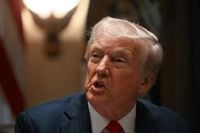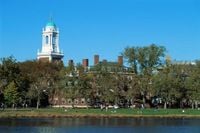In a significant escalation of tensions between the Trump administration and one of the world’s most prestigious universities, Harvard University, the U.S. government announced on April 14, 2025, that it has frozen $2.2 billion in subsidies. This drastic move follows Harvard's refusal to comply with a series of demands issued by President Donald Trump, which the university deemed unconstitutional.
The Department of Education justified the funding freeze by citing issues of antisemitism on campus, stating, "The interruption of learning that has affected campuses in recent years is unacceptable. Harassment of Jewish students is intolerable. (...) The Joint Task Force to Combat Anti-Semitism announces a freeze of $2.2 billion," according to a government statement.
Earlier in April, the Trump administration had outlined several demands to Harvard, including the elimination of Diversity, Equity, and Inclusion (DEI) programs and changes to policies that they claimed "feed antisemitic harassment." The university's leadership responded firmly, asserting that it would not relinquish its independence or constitutional rights. Harvard's lawyers emphasized that the institution has taken significant measures over the past 15 months to combat antisemitism, positioning itself as proactive in addressing these issues.
Alan Garber, Harvard's president, articulated the university's stance when he stated, "No government — regardless of the party in power — should dictate what private universities can teach, who they can admit and hire, and what areas of study and research they can pursue." This statement reflects a broader concern among academic institutions regarding government overreach into educational governance.
The demands from the Trump administration not only included the cessation of DEI programs but also called for the reporting of foreign students who violate conduct codes to federal authorities and hiring external personnel to ensure a "diversity of points of view" within academic departments. Garber's response highlighted the unprecedented nature of these demands, which he argued would significantly undermine the university's academic freedom.
Moreover, the Trump administration's threats are not isolated; they follow a pattern of punitive actions against universities perceived to be hostile to the administration's agenda. Just last month, the government cut $400 million in federal funding to Columbia University after the institution did not comply with similar demands.
In a letter responding to the Trump administration's demands, Harvard's legal team stated, "We are not prepared to agree to demands that go beyond the legal authority of this or any administration." This legal argument hinges on the First Amendment, which protects academic freedom and freedom of expression, principles that Harvard argues are being undermined by the government's actions.
While Harvard has faced scrutiny for its handling of antisemitism, the university maintains that it has made substantial progress in combating these issues. Over the past year, it has implemented new policies and initiatives aimed at fostering a more inclusive environment on campus.
In the wake of these developments, academic unions have rallied in support of Harvard, with the American Association of University Professors (AAUP) and its Harvard chapter filing a lawsuit against the Trump administration. They seek a temporary restraining order to prevent federal funding cuts, arguing that the government's demands violate the rights of universities and their faculty.
Nikolas Bowie, a representative from the AAUP-Harvard, stated, "No law in this country allows President Trump to suspend billions of dollars from universities simply because he does not like their policies on transgender athletes, their research on climate change, or the constitutionally protected freedom of expression of their students and professors." This statement underscores the growing concern among educators about the implications of government interference in academic matters.
The ongoing conflict between Harvard and the Trump administration illustrates a broader national debate over the role of universities in addressing social issues and the extent of governmental influence in educational policies. As protests against the war in Gaza have intensified, universities have found themselves at the center of these contentious discussions, often facing backlash from both sides of the political spectrum.
Despite the administration's threats, Harvard's leadership remains steadfast in its commitment to academic independence. Garber has asserted that the university will not compromise its values or its mission to provide a welcoming environment for all students.
As the situation unfolds, it remains to be seen how this conflict will affect Harvard's funding and its broader relationship with the federal government. With federal subsidies accounting for approximately 11% of Harvard's annual budget of $6.4 billion, the financial implications of this standoff could be profound.
In conclusion, the freeze on funding marks a pivotal moment in the ongoing struggle between federal authority and academic freedom, with Harvard standing firm against what it perceives as overreach by the Trump administration. This confrontation not only highlights the challenges faced by educational institutions today but also raises critical questions about the future of academic freedom in the United States.










